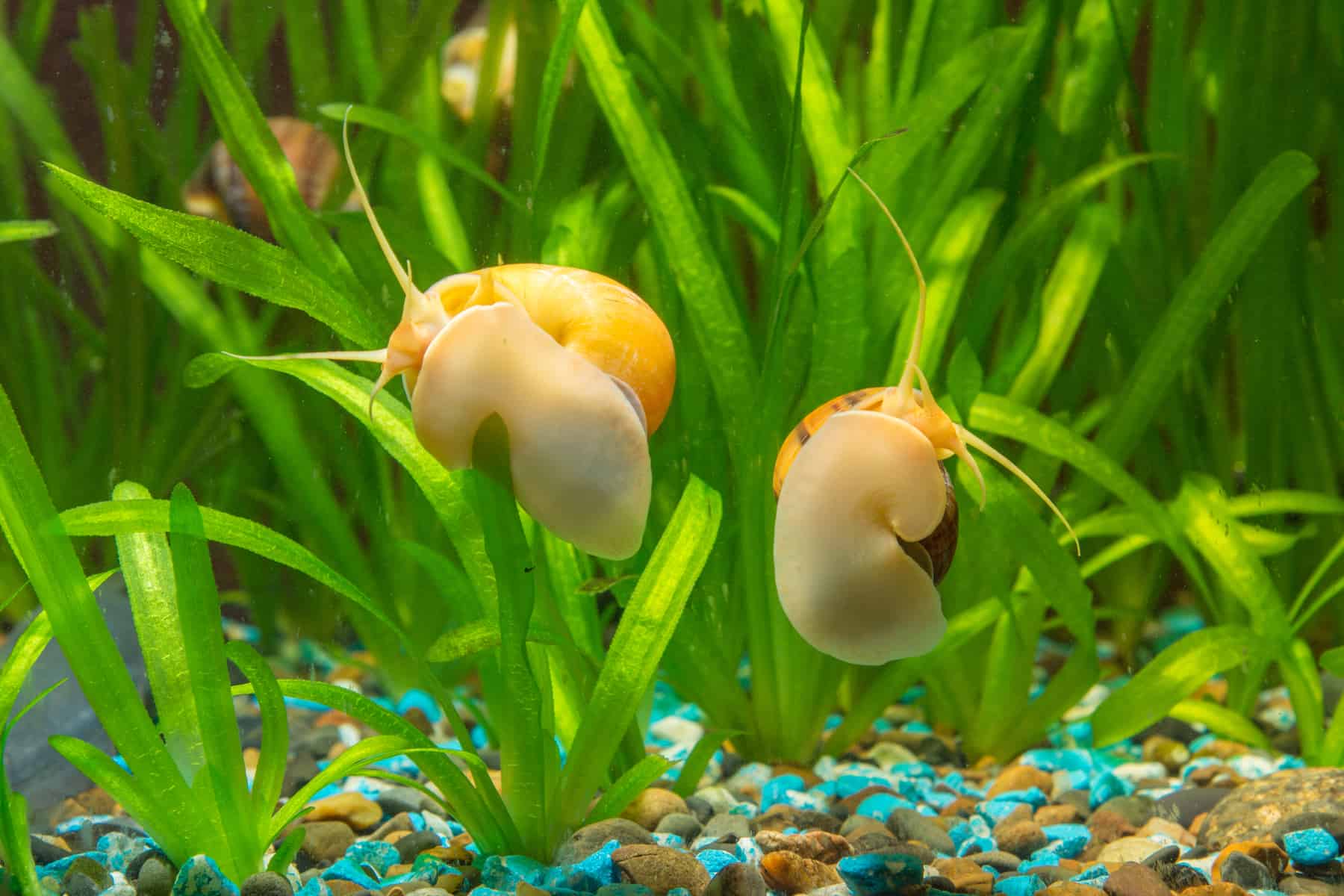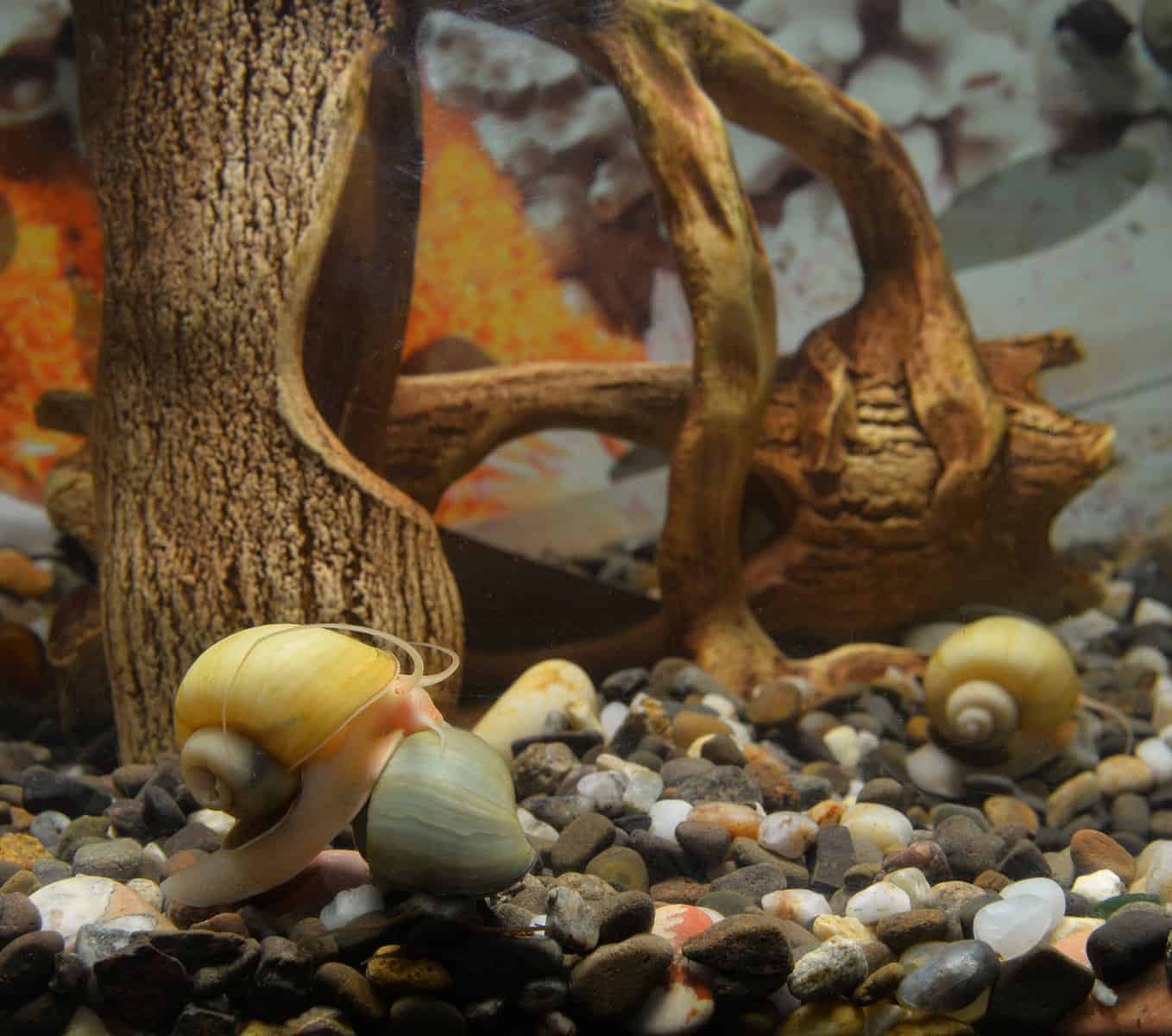One theory as to how mystery snails got their name is the phenomenal rate at which they breed. One day you have just two snails, and the next you wonder how you have two hundred of them!
But if you want your mystery snails to successfully reproduce, you may be concerned about their eggs drying out. Since these mysterious mollusks lay their eggs above the water, it’s only natural to wonder if they could shrivel and die.
The answer is that mystery snail eggs can dry out, but as long as they’re kept in a fairly humid environment, it’s unlikely. Let’s take a closer look at the marvels of mystery snail breeding and egg care.
Why Do Mystery Snails Lay Eggs Out of the Water?
Mystery snails lay their eggs out of the water to protect them from potential predators. Since fish, shrimp, and other aquatic animals sometimes enjoy snacking on snail eggs, this species has evolved a remarkable strategy to avoid its eggs being eaten!
In an aquarium, the female mystery snail will climb out of the water to lay eggs above the water line – typically on the aquarium glass. When she’s done, she will lower herself back into the water.
Why Are My Mystery Snail Eggs So Hard?

Many people are surprised by how hard their mystery snail eggs are. But the reason that they become so tough is the same reason that they lay their eggs out of water: to protect them.
Although mystery snail eggs are quite soft when they are first lain, they stiffen up after 24 hours or so. These hard eggs are quite natural and shouldn’t be confused with eggs that are drying out!
Do I Need to Lower the Water Level for My Mystery Snail To Lay Eggs?
Some mystery snail breeders intentionally lower the aquarium water level so that their mystery snails will have a few inches of space on the glass above the water line to lay their eggs. Other times, a female mystery snail will simply store her fertilized eggs inside her until the water level has dropped so that she can deposit them on the glass.
It’s a good idea to lower the water level periodically to allow mystery snails to lay their eggs on the glass, otherwise, they may be tempted to lay them somewhere less suitable!
Help! My Mystery Snail Has Laid its Eggs on the Tank Hood / Tank Lid
If there is no space to lay eggs on the glass above the water’s surface, a female mystery snail may choose to lay them in the fish tank’s hood or lid. This may seem alarming, and you may fear that the eggs could get too hot near the light and dry out.
In reality, healthy adult snails usually know what they’re doing and will lay their eggs in the perfect place. But it’s still helpful to know a thing or two about how to care for them.
Caring for Mystery Snail Eggs
Female mystery snails typically lay between 50-200 eggs in a sticky bundle sometimes referred to as an ‘egg mass’ or even ‘cocoon’.
If the eggs are laid on the glass above the water and there’s a tight-fitting lid on the tank, the atmosphere should be moist and humid enough that the eggs will survive and hatch out on their own.
If the tank’s lid isn’t tight fitting or has big ventilation holes in it, there’s a chance it may not create a sufficiently humid environment to keep the eggs moist. Similarly, if the eggs are laid in the aquarium hood too close to the light, they’re more likely to get hot and dry out.
Keeping Mystery Snail Eggs Moist
While mystery snail eggs drying out is relatively unlikely, you could take some precautions to make it less likely to happen.
Method 1 – Spray the Eggs With a Fine Mist
The first method for keeping mystery snail eggs moist is to spray them with a fine mist. Use a spray bottle with a mist setting and fill it with water from the aquarium.
Leave the eggs where they are, and spray them at least a few times a day when the aquarium lights are on to keep them well hydrated. Continue this spraying routine until the eggs are hatched.
Method 2 – Remove the Eggs and Place Them in a Breeding Box
When mystery snail owners want to make absolutely sure that their eggs will hatch, they’ll sometimes move them to a moist plastic container floating on top of the aquarium.
Choose an open Tupperware container or something similar and place a piece of aquarium filter foam or a damp paper towel in it. Fill it with tank water until it is about half full and make sure the sponge or paper towel is fully saturated.
Now carefully remove the egg clutches with your hands or a spoon (don’t worry, the eggs are harder than they look!) and place them on top of the wet sponge. Use tape, suction cups, or a cable tie to secure the box into a corner of the tank so that it doesn’t float around.
Now that the eggs are in permanent contact with the wet sponge, they will never dry out. When the baby snails hatch, they can simply climb out of the box and into the aquarium water.
How Long Does It Take Mystery Snail Eggs To Hatch?
How long it takes for mystery snail eggs to hatch depends a lot on the water temperature. If your aquarium heater’s thermostat is set to 73°F, then the atmosphere just above the tank is likely to share this temperature, and the eggs will take between 15-24 days to hatch. If you turn your thermostat up to 78°F, then your eggs will hatch in 9-12 days.
If a mystery snail lays her eggs right next to the aquarium’s lighting unit, it may be because she’s looking for the warmest place for them to develop quickly. If they remain moist, they could hatch in as little as 8 days.
How Do I Raise Baby Mystery Snails?

When a mystery snail egg clutch first hatches, mystery snail babies have tiny shells, only about 2.5mm across. If there are fish that eat snails in the tank, they are likely to eat many of the babies, so if you want to nurture the majority of them to adulthood, you might need to do so in a separate tank. For this, a 5 or 10-gallon heated aquarium with a simple sponge filter would be ideal.
Baby mystery snails’ only major requirement is enough algae. Studies have shown that they have better chances of surviving if they have enough algae to eat rather than being forced to eat other foods such as fish food.
If you don’t have enough algae growing in your tank, you can supplement their diet with algae wafers, such as those typically given to plecos and other algae eaters.
Mystery Snail Eggs FAQs
Help! My Mystery Snail Has Laid Eggs in My Room!
It happens! Adult mystery snails are famous for escaping the tank, which is another great reason to keep them in a tank with a tight-fitting lid!
Sometimes, a female mystery snail might leave the aquarium looking for the perfect humid, damp place to lay her eggs. It’s unlikely that such a place exists inside your house, so the eggs will often end up getting laid somewhere like your wall!
In this case, the eggs will definitely need your intervention to save them! I’d recommend scooping them up and placing them in a floating box as described above.
Can I Submerge Mystery Snail Eggs Underwater?
Absolutely not! Mystery snails have evolved to lay their eggs above water. If the eggs become submerged they will drown and die. If your mystery snail lays eggs above the water line, you must refrain from filling the fish tank to the top in order to avoid killing them.
How Fast Do Baby Mystery Snails Grow?
Baby mystery snails are famous for growing fast. If they have a plentiful supply of algae, they can attain one inch in shell diameter in as little as 8 months.
Conclusion
While mystery snails’ eggs can dry out, it’s a rare event since the mother snail normally knows the perfect place to lay her eggs.
If you have good reason to be concerned about your mystery snail’s eggs drying out, choose one of the two methods suggested above to keep them moist and healthy. They should hatch out between 8 days to 1 month depending on your aquarium temperature.
To learn more about caring for mystery snails, don’t miss our dedicated guide to these fascinating pets here.
The post Have Your Mystery Snail Eggs Dried Out? Then Read on… appeared first on Aquariadise.
